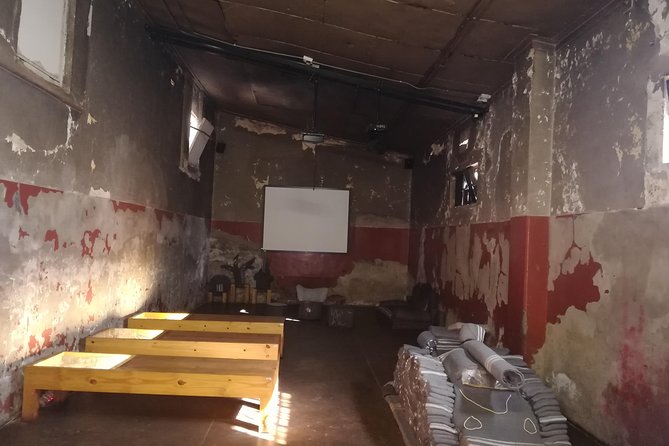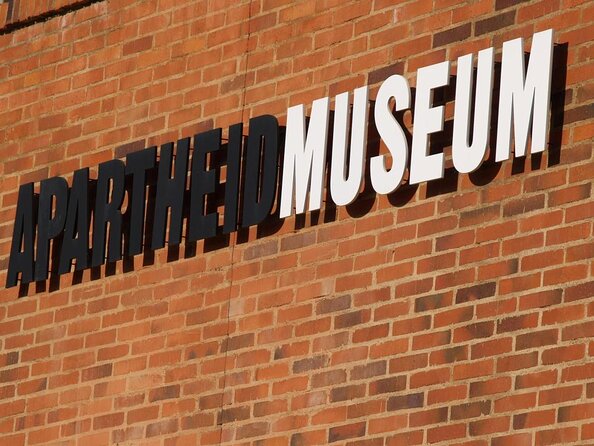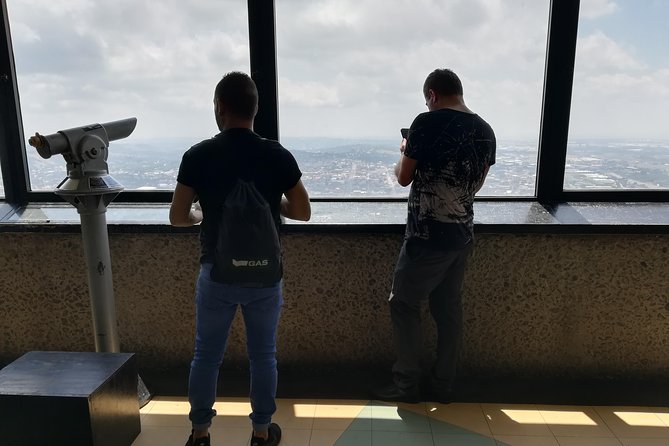In the heart of Johannesburg, a city that has witnessed both triumph and turmoil, lies a museum that encapsulates the struggle for equality and justice. The Apartheid Museum stands as a stark reminder of South Africa’s troubled past, where racial segregation reigned supreme and human rights were trampled upon.
This museum, with its evocative exhibits and immersive displays, invites visitors to step into the shoes of those who lived through the apartheid era. But it is not just a museum; it is a gateway to understanding, a catalyst for reflection, and a catalyst for change.
As one enters this hallowed space, the weight of history hangs heavy in the air, beckoning visitors to embark on a journey that will challenge their preconceptions and ignite their empathy.
Good To Know

- The Apartheid Museum is a powerful testament to the struggles and triumphs of South Africans during apartheid.
- The museum’s exhibits and artifacts vividly depict the harsh realities of apartheid and provide an immersive experience for visitors.
- Johannesburg offers a unique and vibrant cultural experience, with diverse neighborhoods, traditional cuisine, and a thriving art scene.
- The impact of apartheid on South African society is still felt today, with enduring economic inequality and a political landscape shaped by resistance movements.
History of Apartheid in South Africa

The history of apartheid in South Africa reveals a dark period of systematic racial segregation and oppression. The Apartheid Museum in Johannesburg stands as a significant testament to this painful era.
The museum showcases a series of exhibits that vividly depict the harsh realities of apartheid. Visitors are taken on a journey through the museum’s thought-provoking displays, which include photographs, artifacts, and personal testimonies. These exhibits serve as a powerful reminder of the immense suffering endured by the black majority under the apartheid regime. They also highlight the resilience and determination of those who fought against the injustices of apartheid.
The significance of the Apartheid Museum lies in its ability to educate and create awareness about this dark chapter in South Africa’s history, ensuring that it’s never forgotten.
Like museums? Other Pretoria cultural attractions we've reviewed
Significance of the Apartheid Museum

Highlighting the enduring legacy of South Africa’s apartheid era, the Apartheid Museum in Johannesburg stands as a poignant testament to the struggles and triumphs of the nation’s past.
The significance of the museum lies not only in its historical content but also in its architectural design, which mirrors the stark divisions of apartheid itself. With its separate entrances and winding paths, the museum immerses visitors in the segregation experienced during that time, allowing them to confront the harsh reality firsthand.
Plus, the museum recognizes the role of art in addressing apartheid, showcasing powerful artworks that capture the emotions and experiences of those affected by the oppressive regime.
Through its thought-provoking exhibits and innovative design, the Apartheid Museum serves as a powerful tool for education, remembrance, and reconciliation.
Exhibits and Artifacts at the Museum
Continuing the exploration of the Apartheid Museum, visitors are immersed in a compelling collection of exhibits and artifacts that vividly depict the realities of South Africa’s apartheid era. The museum showcases a range of interactive displays that allow visitors to engage with the history and understand the impact of apartheid. From multimedia presentations to personal testimonies, these exhibits provide a deeply immersive experience.
One of the highlights is the section dedicated to the anti-apartheid movement, which features photographs, documents, and items associated with key figures like Nelson Mandela and Desmond Tutu. These artifacts offer a glimpse into the struggle for freedom and equality in South Africa.
Through the exhibits and artifacts, visitors gain a profound insight into the injustices of apartheid and the resilience of those who fought against it.
Exploring Johannesburg’s Cultural Heritage
Johannesburg’s rich cultural heritage beckons visitors with its vibrant mix of history, art, and traditions. Here are some fascinating aspects of Johannesburg’s cultural heritage that are worth exploring:
History of Johannesburg’s neighborhoods: Take a walk through the city’s diverse neighborhoods, such as Newtown, Maboneng, and Soweto, to uncover the stories and historical significance behind each area. From the iconic Vilakazi Street, where Nelson Mandela once lived, to the bustling markets of Newtown, these neighborhoods offer a glimpse into the city’s past.
Traditional cuisine in Johannesburg: Indulge in a culinary journey through Johannesburg’s traditional cuisine, which is a melting pot of flavors and influences from various cultures. From hearty African stews like bobotie and potjiekos to Indian-inspired bunny chow and Portuguese peri-peri chicken, the city’s food scene is a reflection of its multicultural heritage.
Artistic expressions: Enjoy Johannesburg’s thriving art scene, from vibrant street art to world-class galleries and museums. Explore the cutting-edge contemporary art at the Wits Art Museum, or visit the Market Theatre to witness the city’s rich theatrical traditions.
Cultural festivals and events: Johannesburg is known for its lively festivals and cultural events that celebrate the city’s diverse heritage. From the vibrant Johannesburg Carnival to the festive FNB Joburg Art Fair, there’s always something happening in the city to showcase its cultural richness.
With its captivating history, delicious cuisine, artistic expressions, and vibrant festivals, Johannesburg offers a cultural experience like no other.
Impact of Apartheid on South African Society
As visitors enjoy Johannesburg’s rich cultural heritage, they can’t ignore the profound impact that apartheid has had on South African society.
One of the most significant effects of apartheid is the enduring economic inequality that plagues the country. The apartheid regime systematically marginalized and oppressed the majority of the population, creating a stark divide between the wealthy minority and the impoverished majority. Even though apartheid officially ended in 1994, the scars of economic inequality remain.
Another consequence of apartheid is the legacy of political resistance. The struggle against apartheid galvanized a generation of activists and leaders who fought for equality and freedom. This resistance movement played a crucial role in dismantling the apartheid regime and shaping the democratic South Africa we see today.
The impact of apartheid on South African society is undeniable and continues to shape the country’s social and political landscape.
Visiting Soweto Township and Nelson Mandela’s House
When exploring Johannesburg’s rich cultural heritage, a must-visit destination is Soweto Township, where you can discover the iconic Nelson Mandela’s House. Soweto Township tours offer a unique opportunity to explore the history and legacy of Nelson Mandela, the renowned anti-apartheid activist and South Africa’s first black president.
Here are four reasons why you should include a visit to Soweto Township and Nelson Mandela’s House in your itinerary:
Enjoy history: Explore the streets of Soweto and gain insight into the struggles and triumphs of the anti-apartheid movement.
Step into Mandela’s shoes: Visit the humble house where Nelson Mandela lived from 1946 to 1962, and see where he made important decisions that shaped South Africa’s future.
Learn from local guides: Engage with knowledgeable guides who share personal stories and anecdotes about life in Soweto during apartheid.
Experience vibrant culture: Soweto is home to a vibrant community that celebrates its rich culture through music, dance, and art. Don’t miss the chance to engage with locals and experience the spirit of Ubuntu firsthand.
A visit to Soweto Township and Nelson Mandela’s House isn’t only a journey into the past but also an opportunity to celebrate the enduring legacy of Nelson Mandela and the resilience of the South African people.
Tips for Planning Your Visit to the Apartheid Museum and Johannesburg
Continuing your exploration of Johannesburg’s rich cultural heritage, embark on a journey to the Apartheid Museum and discover invaluable insights into South Africa’s tumultuous past. To make the most of your visit, here are some tips for planning your trip to the museum and exploring Johannesburg.
First, consider incorporating the Apartheid Museum into your overall itinerary for Johannesburg. While the museum is a must-visit attraction, there are many other cultural and historical sites in the city that you may want to explore. To help you plan your visit, here are two suggested itineraries:
| Itinerary 1 | Itinerary 2 |
|---|---|
| Morning: Museum | Morning: Museum |
| Afternoon: Soweto | Afternoon: City |
| Evening: Dining | Evening: Shopping |
Next, let’s discuss transportation options. The Apartheid Museum is located in the south of Johannesburg, and public transportation may not be the most convenient option. It is recommended to either rent a car or take a taxi to the museum. Plus, there are guided tours available that include transportation to and from the museum.
Common Questions
How Much Does It Cost to Visit the Apartheid Museum?
Visiting the museum? The cost varies depending on factors like ticket type and any additional services. Make sure to check the website or contact customer service for the most accurate and up-to-date information.
What Are the Opening Hours of the Apartheid Museum?
The opening hours of the Apartheid Museum are from 9:00 am to 5:00 pm. Guided tours are available throughout the day, providing visitors with a deeper understanding of the museum’s historical significance.
Can I Book Tickets in Advance for the Apartheid Museum?
Yes, visitors can conveniently book tickets in advance for the Apartheid Museum. With an easy online reservations system in place, it streamlines the booking process, ensuring a seamless experience for all.
Are Guided Tours Available at the Apartheid Museum?
Guided tours are available at the Apartheid Museum, enhancing the visitor’s experience. These tours provide insightful information and a deeper understanding of the museum’s exhibits, ensuring a comprehensive exploration of apartheid history.
Is Photography Allowed Inside the Apartheid Museum?
Photography policy at the Apartheid Museum allows visitors to capture the historical significance of the exhibits. The museum recognizes the importance of preserving memories and encourages visitors to document their experience through photography.
The Sum Up
To sum it up, the Apartheid Museum in Johannesburg stands as a poignant reminder of South Africa’s troubled past and serves as a powerful educational tool for visitors.
Through its immersive exhibits and thought-provoking displays, the museum offers a profound understanding of the injustices of apartheid. It highlights the importance of human rights, social justice, and the ongoing fight against discrimination.
A visit to the Apartheid Museum and Johannesburg provides a transformative experience that leaves a lasting impact on all who venture there.
More Museum Tours in Pretoria
- Johannesburg: Pretoria and Soweto via Apartheid Museum
- Johannesburg and PTA: Soweto and Apartheid Museum Day Tour
- Private Johannesburg and Soweto With Apartheid Museum Tour
- Private Tour of Gauteng: Pretoria, Apartheid Museum & Soweto
- Johannesburg and Apartheid Museum Private Tour
- Full Day Tour Apartheid Museum and Soweto
More Tour Reviews in Pretoria
Looking for something different? Other Pretoria activities we've written about
- Johannesburg: Pretoria and Soweto via Apartheid Museum
- Johannesburg and PTA: Soweto and Apartheid Museum Day Tour
- 25 Best Guided Tours In Pretoria
- 7 Best Historical Tours In Pretoria
- 25 Best Tours In Pretoria
- 14 Best 3 Day Tours In Pretoria
- 5 Best Private Driver Services In Pretoria
- 8 Best 4 Day Tours In Pretoria
- 20 Best Full-Day Tours In Pretoria
- 25 Best Safari Tours In Pretoria
- 17 Best 2 Day Tours In Pretoria
- 25 Best Guided Tours In Pretoria
